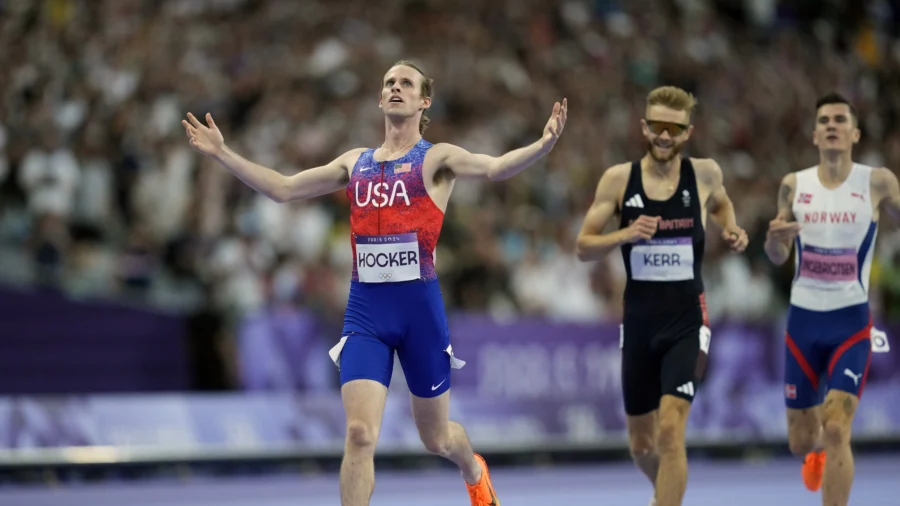SAINT-DENIS, France—American Cole Hocker pulled the upset of the Olympics on Tuesday night, beating his personal-best time by almost three seconds to outrace favorites Jakob Ingebrigsten and Josh Kerr for the gold medal in the men’s 1,500 meters.
Hocker won the race in an Olympic-record 3 minutes, 27.65 seconds, pulling from fifth to first over the final 300 meters to take down the two runners whose rivalry dominated the buildup to the much-anticipated race.
“This may be an upset to a lot of people, but if you’ve been following my season, you knew I was capable of it,” Hocker said. “But, still, things had to go my way today.”
Hocker, a 23-year-old product of the University of Oregon, was listed as much as a 30-1 longshot for this race. He beat Kerr by .14 seconds, while Ingebrigtsen, who set the pace through the first 1,250 meters, ended up fourth, behind American Yared Nuguse.
About an hour after that surprise came an American victory most people saw coming when Gabby Thomas powered through the curve to win the women’s 200-meter title in 21.83 seconds.
Her .25-second margin over 100 champ Julien Alfred was .11-second bigger than Hocker’s, even though Thomas raced half a lap and Hocker nearly four.
Hocker, who recorded his previous personal best of 3:30.59 at the Olympic trials this summer, is only the second U.S. man to win the metric mile at the Olympics over the past 112 years. American Matt Centrowitz took gold in 2016.
“I kind of figured it would be fast,” Hocker said. “I figured Ingebrigtsen would want to take it out of guys like me. But I knew I hadn’t been tested at this level yet, and I knew I was capable of being as strong as any of those guys out there.”
All eyes were trained on Ingebrigtsen, the defending champion from Norway who came in with a point to prove, and Kerr, the Scotsman who beat him at last year’s world championships.
Ever since that win, Kerr and Ingebrigtsen poked at each other. Among the salvos that stuck was Kerr’s assertion that Ingebrigtsen only won races with pacesetters, the likes of which are not allowed at major races like this.
Against that backdrop, Ingebrigtsen darted to the front quickly and ran there for the first 3 1/2 laps, while Kerr traded between second and third, getting ready for his typical windup and a potential slingshot past the Norwegian over the closing stretch, much the way he did last year.
“Of course, it’s a tactical error that I’m not able to reduce my pace the first 800,” Ingebrigtsen said.
While he and Kerr were wearing each other out, Hocker, at 5-foot-9 1/2 and more than 3 1/2 inches shorter than the top two contenders, almost looked like he was trying to photo bomb them at the end of this race.
As they entered the homestretch, he snuck up on the inside once, only to have Ingebrigtsen block that move.
So, Hocker fell back and wound up for another try with about 50 meters left.
Both he and Kerr, who was racing on the outside, passed Ingebrigtsen, then Hocker beat the Scot to the finish line, first with a look of disbelief on his face, but then thumping his chest twice to celebrate a win hardly anyone saw coming—maybe except for him.
The next meeting in another of track’s best rivalries—this one between Sydney McLaughlin-Levrone and Femke Bol—will come in the Olympic final.
The two best at the women’s 400-meter hurdles won their semifinals easily.
McLaughlin-Levrone, who clipped a hurdle in her opening round, went cleanly around the track this time and finished in 52.13. Bol did the lap in 52.57.
The two have only faced off twice. McLaughlin set world records at both races, with Bol finishing third at the last Olympics and second at the 2022 world championships.
“Iron sharpens iron,” McLaughlin said. “It’s always fun racing the best, and I know we’re going to push each other.”
Kirani James, the 2012 Olympic champion, had the best time in the men’s 400-meter semifinals, winning his heat in 43.78.
The runners with the two best times this year, America’s Quincy Hall and Britain’s Matthew Hudson-Smith, won their semifinals and will be joined by American Michael Norman to set up one of the more wide-open finals.
Defending champion Steven Gardiner, struggling with injuries this year, pulled out before the first round.
By Eddie Pells

